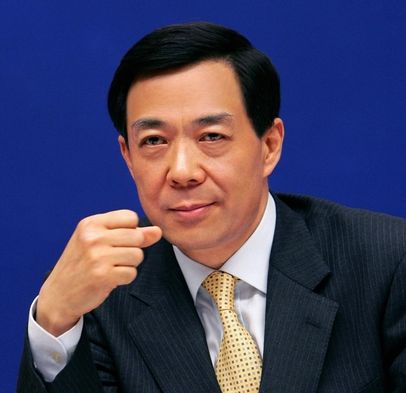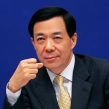
Jockeying for Position Intensifies among Candidates for the Politburo Standing Committee
Publication: China Brief Volume: 11 Issue: 20

The just-ended plenary session of the Chinese Communist Party’s (CCP) Central Committee passed a resolution on “the reform of the cultural system” that is aimed at boosting China’s soft power and buttressing the country’s “cultural security.” Given that the Central Committee usually meets only once a year, all eyes are on what members of this top party organ might have discussed about the 18th Party Congress, which will witness the wholesale changing of guard. The terse plenum communiqué released by the Xinhua News Agency, however, revealed very little about what went on during the four-day conclave. It only noted the 18th Congress would be convened in the second half of 2012. “The national congress is to be held during a crucial period of the construction of a moderately prosperous society in an all-round way, the deepening of reform and opening up and the transformation of the pattern of economic development,” the communiqué said. The Central Committee also called upon party cadres “to unite and lead all the Chinese people in building a moderately prosperous society in an all-around way as well as accelerating the nation’s modernization drive” (Xinhua News Agency, October 18; People’s Daily, October 19).
Despite the dearth of information, it is apparent that jockeying for position has intensified particularly among senior cadres who want to make it into the nine-member Politburo Standing Committee (PBSC), the CCP’s powerful inner sanctum where seven members are expected to step down in 2012. Since the 370-odd full and alternate Central Committee members rarely meet, a plenum is a good chance for would-be PBSC members to engage in subtle campaigning. In the run-up to the Central Committee conclave, up-and-coming members of the party’s two dominant if fractious cliques—the Communist Youth League (CYL) faction under President Hu Jintao and the Gang of Princelings (a reference to the offspring of party elders)—have been actively trying to enhance their chances for promotion next year (Bloomberg, October 14; Agence France Presse, October 19).
The most visible example is Chongqing Party Secretary, Bo Xilai, who is already a Politburo member. For the past three years, Bo, 62, a charismatic princeling, has become one of China’s most high-profile politicians thanks to his populist campaign to “sing red songs and to strike at black elements,” a reference to reviving Maoist-era norms and combating organized crime (See “The CCP’s Disturbing Revival of Maoism,” China Brief, November 19, 2009). Despite the relative enthusiasm with which the chang hong (“singing red songs”) movement has been received in different cities, the Central Committee did not give its imprimatur to reviving Maoist culture. The plenum communiqué urged all Chinese to “use as motivation [the spirit of] reform and creativity” so as to create cultural products that are “geared toward modernization and focused on the world and on the future.” “We must raise the cultural standard of all the people, boost the nation’s cultural soft power, propagate Chinese culture and assiduously build up a culturally strong socialist country,” it said (China News Service, October 18; Sina.com, October 18). That no reference whatsoever was made to “red culture” seems to support the thesis that the country’s two top leaders—President Hu and Premier Wen Jiabao—are not fans of Bo’s chang hong persuasion. Moreover, despite the metropolis’s status as one of China’s four centrally administered cities in addition to being the business hub of western China, neither Hu nor Wen has visited Chongqing since Bo became its party boss in late 2007 (Cablenews Hong Kong, October 14; The Globe and Mail, October 8).
Bo’s near-desperate efforts to claim credit for the "Chongqing Model" also suggest his political fortunes may be waning or, at least, under attack. In early October, Bo invited the younger brother of Deng Xiaoping, Deng Ken, to write two scrolls of calligraphy for the city: “Never cease to strengthen oneself” and “Both hands must be equally tough.” This was apparent praise for Chongqing’s success in nurturing both material and spiritual civilization. At about the same time, Chongqing Daily ran a long interview with the retired cousin of Hu Jintao, Hu Jinxing. Hu, who heads a charitable organization in Shanghai, eulogized the Bo administration for “doing good work for the people’s livelihood and upholding the path of egalitarianism.” Hu added “Chongqing has provided valuable experience for exploring the road of socialism with Chinese characteristics.” Within the largely conservative Chinese political tradition, it is uncommon for a politician to promote himself aggressively by soliciting the help of the relatives of either former or current party chiefs (Chongqing Daily, October 6; Wyzxsx.com [Beijing], October 8; Sina.com, October 13).
Should Bo fail to make it, fellow princeling Yu Zhengsheng, the Party Secretary of Shanghai, is seen as having a good chance of being inducted to the PBSC. Yu, who is sometimes called the “big brother among the princelings,” is as low-profile as Bo is flamboyant. By the time the 18th Congress opens, Yu will have reached 67, the maximum age now acceptable for getting into the PBSC. While Yu’s track record as Party Secretary of Shanghai—and before this, party boss of Hebei Province—is deemed mediocre, he is acceptable to most factions within the CCP. Moreover, Yu’s status as a representative of the interests of Deng Xiaoping’s family could endear him to cadres who consider themselves disciples of the "Great Architect of Reform" (The Australian, October 11; Apple Daily [Hong Kong] July 6).
Not everything however has been going against Bo. The unexpected appearance of ex-president Jiang Zemin on October 9 at a Great Hall of the People gathering marking the centenary of the 1911 Revolution is considered to be positive news for princelings such as Bo. The 85-year-old former top leader’s failure to show up at a July function celebrating the CCP’s 90th birthday had given rise to widespread speculation that he was close to death. Jiang, who is himself a princeling, was a good friend of Bo’s now-deceased father, party elder Bo Yibo. At the 17th Party Congress in 2007, Jiang also played a pivotal role in the selection of Vice President Xi Jinping, another princeling, as Hu’s presumptive successor as party chief and state president. Before he fell sick earlier this year, Jiang reportedly gave strong backing to Vice Premier Wang Qishan—the son-in-law of late Vice Premier Yao Yilin—to replace Wen Jiabao as premier shortly after the 18th Party Congress. This was despite the tacit understanding at the 17th Party Congress that Executive Vice Premier Li Keqiang, a stalwart of the CYL Faction and a key protégé of President Hu’s, would be given Wen’s job (New York Times, October 9; Ming Pao [Hong Kong] October 10).
Developments prior to and after the Sixth Central Committee Plenum, however, seem to indicate that the political fortune of Li, 56, is on the upswing—and that he should have no problem becoming Wen’s successor as head of government. This was attested to by the fact that the official media ran several laudatory articles on Li’s achievements when he served in the provinces. For example, Xinhua News Agency earlier this month carried a piece by commentator Gong Wen praising Li’s performance while serving in Henan Province from 1998 to 2004. The article eulogized Li for setting up viable economic links with both the East and West: “Li attracted technology, funds and talents from developed countries…Henan also established ties with East Asia, Central Asia and Eastern Europe.” The article, which originally appeared in the journal Party Construction, also lauded Li’s track record in agriculture, claiming “Henan not only manages to feed its 100 million inhabitants but has provided other provinces with a big variety of processed foods.” A couple of other state media outlets carried stories about Li as a model youth who went on a rustication campaign in the Anhui countryside from 1974 to 1977. The reports praised the young Li’s ability to study well into the night despite having worked hard in the fields during the day (Xinhua News Agency, October 9; News.ifeng.com [Beijing], October 11).
A spate of high-profile visits both in and out of China suggests the executive vice premier’s star continues to rise. For example, Li represented the State Council when he visited Hong Kong in August, during which he pledged preferential economic policies to sustain the economy of the special administrative region. In early September, Li officiated at the first China-Eurasia Expo in Urumqi, Xinjiang. The Expo represented an ambitious effort by the Chinese to boost economic and other links with countries including Pakistan, Afghanistan, Kyrgyzstan, Azerbaijian and Kazakhstan (China News Service, September 1; China.org.cn, August 17). Last Sunday, Li embarked on a week-long trip to the DPRK and South Korea in an apparent effort to revive the long-stalled Six Party Talks on denuclearization in the Korean Peninsula (Xinhua News Agency, October 23; China Daily, October 23).
The plenum also has shed light on the PBSC chances of cadres who are not aligned with either the CYL Faction or the Gang of Princelings. If only because of the growing importance that the party leadership has attached to issues relating to culture, ideology and soft power, Liu Yunshan—the Politburo member in charge of propaganda—has a greater chance of securing the PBSC slot held by Li Changchun next year. While the 64-year-old ideologue has been criticized by liberal intellectuals as a conservative commissar, he has endeared himself to different CCP factions by ably manning the fort of orthodoxy. The former Xinhua journalist also is seen as having been effective in ensuring that destabilizing and “disharmonious” voices are kept out of the public discourse (China Daily, May 31; Asia Times [Hong Kong], May 1, 2010). That the CCP has devoted an entire Central Committee plenum to culture and ideology also reflects Liu’s ability to draw the party’s attention to hitherto neglected areas such as projecting Chinese soft power and safeguarding the country’s “cultural security.”
A key goal of “cultural reform,” as stated by the Central Committee, is that all Chinese should “strengthen their cultural self-consciousness and cultural confidence” so as to better “boost the country’s cultural soft power.” Since it has long been the party’s goal to aggressively propagate the China model of authoritarian one-party rule both domestically and abroad, it seems unlikely that “Western-style” political mechanisms will be introduced to the process of picking the CCP’s Politburo members. This is despite pledges made by President Hu and Premier Wen about respectively expanding “intra-party democracy” and adopting “global norms” such as democracy and the rule of law. Befitting the party’s long tradition of factional intrigue, the composition of the new Politburo and its Standing Committee will likely be determined by old-style skullduggery and horse-trading with Chinese characteristics.





